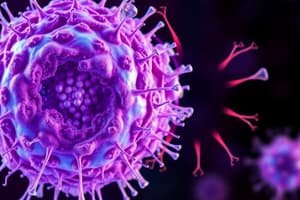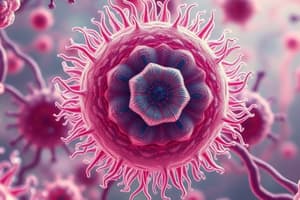Podcast
Questions and Answers
Which of the following correctly describes prokaryotic cells?
Which of the following correctly describes prokaryotic cells?
- They contain membrane-bound organelles.
- They have a defined nucleus.
- They are always larger than eukaryotic cells.
- They are simple cells lacking membrane-bound structures. (correct)
Which organelle is found only in plant cells?
Which organelle is found only in plant cells?
- Lysosomes
- Mitochondria
- Chloroplast (correct)
- Ribosomes
What is a key difference between plant and animal cells?
What is a key difference between plant and animal cells?
- Animal cells have a cell wall.
- Both types of cells have the same organelles.
- Plant cells have a large central vacuole. (correct)
- Plants have glycogen as an energy storage molecule.
Which of the following organelles is present in both plant and animal cells?
Which of the following organelles is present in both plant and animal cells?
Which of these structures is exclusive to eukaryotic cells?
Which of these structures is exclusive to eukaryotic cells?
Which of the following statements about eukaryotic cells is true?
Which of the following statements about eukaryotic cells is true?
Which organelle is typically found only in animal cells?
Which organelle is typically found only in animal cells?
What fundamental concept is illustrated by the statement that all living things are made of one or more cells?
What fundamental concept is illustrated by the statement that all living things are made of one or more cells?
Which of the following characteristics is NOT typically used to describe the functions of cells?
Which of the following characteristics is NOT typically used to describe the functions of cells?
Which observation would best support the idea that all cells originate from pre-existing cells?
Which observation would best support the idea that all cells originate from pre-existing cells?
Which of the following statements best summarizes the cell theory?
Which of the following statements best summarizes the cell theory?
If a scientist wanted to test whether all living things are made of cells, which type of evidence would be most useful?
If a scientist wanted to test whether all living things are made of cells, which type of evidence would be most useful?
Flashcards are hidden until you start studying
Study Notes
Prokaryotic Cells
- Lack a nucleus and membrane-bound organelles
- Considered structurally simpler than eukaryotic cells
- Examples include bacteria
Eukaryotic Cells
- Have a nucleus and membrane-bound organelles
- Considered structurally more complex than prokaryotic cells
- Examples include animal, plant, and fungal cells
Plant Cells
- Possess unique organelles like chloroplasts, a cell wall, and a large central vacuole
- Chloroplasts are responsible for photosynthesis
- Cell wall provides structural support and protection
- Large central vacuole stores water and nutrients
Animal Cells
- Lack chloroplasts, cell walls, and large central vacuoles
- Possess lysosomes, which break down waste materials
Both Plant and Animal Cells
- Share common organelles including the nucleus, vacuoles, endoplasmic reticulum, ribosomes, Golgi apparatus, mitochondria, and the cell membrane
- Nucleus houses the cell's genetic material (DNA)
- Vacuoles store water, nutrients, and waste products
- Endoplasmic reticulum (ER) is involved in protein and lipid synthesis
- Ribosomes are responsible for protein synthesis
- Golgi apparatus modifies, sorts, and packages proteins and lipids
- Mitochondria generate energy for the cell through cellular respiration
- Cell membrane controls what enters and exits the cell
Cell Theory
- All living things are composed of one or more cells.
- Cells are the basic unit of life.
- All cells arise from pre-existing cells.
Evidence for Cell Theory
- Cells can be observed under a microscope.
- Cells reproduce asexually through budding, as seen in yeast cells.
Testing Cell Theory
- Observations:
- Cells obtain energy.
- Cells develop and grow.
- Cells produces waste.
Studying That Suits You
Use AI to generate personalized quizzes and flashcards to suit your learning preferences.




